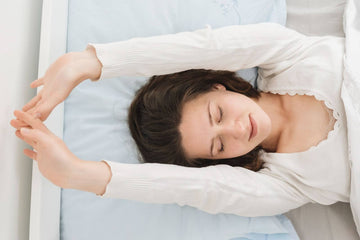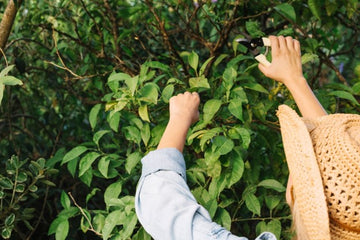In today's fast-paced world, anxiety has become a prevalent issue affecting millions of people. While medication can provide relief, many individuals are turning to natural remedies to manage their anxiety. If you're on a quest to find effective natural anxiety relief remedies, you've come to the right place.
Nature has always been a powerful source of healing, and now, more than ever, people are tapping into its potential to calm their anxious minds. From herbal supplements to mindfulness techniques, there is a wide range of natural remedies that can help reduce anxiety levels and promote overall well-being.
In this article, we delve into the world of natural anxiety relief remedies, exploring their effectiveness and providing practical tips on how to incorporate them into your daily routine. So, get ready to discover the power of nature and find the peace and serenity you've been seeking. Bid farewell to anxious thoughts and embrace a calmer, more balanced life.
Join us as we explore the wonders of natural remedies and embark on a journey toward greater mental well-being. Let nature guide you on the path to a calmer mind and a happier you.
Understanding anxiety and its impact
Anxiety is a natural response to stress, but when it becomes overwhelming and interferes with daily life, it can be debilitating. The symptoms of anxiety can vary from person to person, but common signs include excessive worry, restlessness, irritability, and difficulty concentrating. Long-term anxiety can also lead to physical symptoms such as headaches, muscle tension, and sleep disturbances.
Living with anxiety can be challenging, but understanding the underlying causes and triggers is the first step toward finding effective relief. Anxiety can be caused by a combination of genetic, environmental, and psychological factors. Identifying these factors can help individuals develop strategies to manage their anxiety and find natural remedies that work best for them.

Natural remedies for anxiety relief
1. Herbal Supplements for Anxiety
Herbal supplements have been used for centuries to promote relaxation and reduce anxiety. Some of the most popular herbal remedies include:
- Passionflower: Passionflower is a plant that has been traditionally used to calm the mind and reduce anxiety. It works by increasing the levels of a neurotransmitter called gamma-aminobutyric acid (GABA), which helps regulate anxiety.
- Valerian Root: Valerian root is a herb known for its sedative properties. It can help reduce anxiety and improve sleep quality.
- Lavender: Lavender is a fragrant herb that has a calming effect on the nervous system. It can be used in the form of essential oil or tea to promote relaxation and reduce anxiety.
2. Incorporating Essential Oils for Anxiety Relief
Essential oils are concentrated plant extracts that can be used to promote relaxation and reduce anxiety. Here are some popular essential oils for anxiety relief:
- Lavender Oil: Lavender oil is one of the most versatile essential oils. It has a soothing aroma that can help reduce anxiety and promote better sleep.
- Chamomile Oil: Chamomile oil is known for its calming properties. It can help reduce anxiety and promote a sense of peace and tranquility.
- Bergamot Oil: Bergamot oil has a citrusy scent that can uplift the mood and reduce anxiety. It is often used in aromatherapy to promote relaxation and stress relief.
3. The Power of Mindfulness and Meditation
Mindfulness and meditation are powerful tools for managing anxiety. By focusing on the present moment and cultivating a non-judgmental attitude, individuals can reduce anxiety and improve their overall well-being. Here are some mindfulness and meditation techniques to try:
- Deep Breathing: Deep breathing exercises can help calm the nervous system and reduce anxiety. Take slow, deep breaths, focusing on the sensation of the breath entering and leaving the body.
- Body Scan Meditation: Body scan meditation involves systematically focusing on each part of the body, paying attention to any sensations or tension. This practice can help individuals become more aware of their bodies and release physical and mental tension.
- Guided Imagery: Guided imagery involves using the power of imagination to create a calming and peaceful mental image. This technique can help redirect anxious thoughts and promote relaxation.
4. Relaxation Techniques for Anxiety Management
In addition to herbal supplements and mindfulness techniques, there are various relaxation techniques that can help reduce anxiety. These techniques aim to activate the body's relaxation response and counteract the physiological effects of stress. Here are some relaxation techniques to consider:
- Progressive Muscle Relaxation: Progressive muscle relaxation involves tensing and releasing each muscle group in the body, starting from the toes and working up to the head. This practice can help individuals become more aware of muscle tension and learn to relax the body.
- Yoga: Yoga combines physical postures, breathing exercises, and meditation to promote relaxation and reduce anxiety. Regular practice of yoga can help individuals build strength, flexibility, and resilience.
- Tai Chi: Tai Chi is a gentle form of exercise that involves slow, flowing movements and deep breathing. It can help improve balance, reduce stress, and promote a sense of calmness.
5. The Role of Exercise and Physical Activity in Reducing Anxiety
Exercise is not only beneficial for physical health but also plays a crucial role in managing anxiety. Regular physical activity can help reduce anxiety levels and improve mood by increasing the production of endorphins, also known as "feel-good" hormones. Here are some types of exercise that can be particularly helpful for anxiety relief:
- Cardiovascular Exercise: Cardiovascular exercise, such as running, swimming, or cycling, can help release tension, boost mood, and improve sleep quality.
- Yoga and Pilates: Yoga and Pilates combine physical movement with mindful breathing, making them effective for reducing anxiety and promoting relaxation.
- Nature Walks: Spending time in nature has been shown to have a positive impact on mental well-being. Going for a walk in a park or hiking in the woods can help reduce anxiety and promote a sense of calmness.
6. Creating a Healthy Lifestyle for Anxiety Management
In addition to specific remedies and techniques, creating a healthy lifestyle can have a significant impact on anxiety management. Here are some lifestyle factors to consider:
- Healthy Diet: A well-balanced diet that includes whole grains, lean proteins, fruits, and vegetables can help support overall mental and physical health. Avoiding excessive caffeine and sugar can also help reduce anxiety symptoms.
- Adequate Sleep: Getting enough quality sleep is essential for managing anxiety. Establishing a regular sleep routine, creating a comfortable sleep environment, and practicing relaxation techniques before bed can promote better sleep.
- Stress Management: Finding healthy ways to cope with stress can help prevent anxiety from escalating. Some effective stress management techniques include journaling, practicing gratitude, and seeking social support.
7. Seeking Professional Help for Anxiety
While natural remedies can be beneficial, it's important to remember that everyone's anxiety is unique, and what works for one person may not work for another. If anxiety symptoms persist or significantly interfere with daily life, it's crucial to seek professional help. A mental health professional can provide guidance, support, and personalized treatment options to help manage anxiety effectively.
Learn how to get stress and anxiety relief with this FREE COURSE!
10 STEPS TO GET MIND CLARITY AND STRESS RELIEF.
Mind clarity and Stress relief: You will learn how to manage the 4 key areas of the mind: Perception, Intelligence, Identity, and Memory, and how to combat stress and worry, improving mental clarity and mind balance.
>> DOWNLOAD THIS COURSE
Herbal supplements for anxiety
In conclusion, the power of nature is undeniable when it comes to managing anxiety. From herbal supplements to mindfulness techniques, there are numerous natural remedies that can help reduce anxiety and promote overall well-being. By incorporating these remedies into your daily routine and seeking professional help when necessary, you can embark on a journey toward greater mental well-being.
Remember, finding the right natural anxiety relief remedies may require some experimentation and patience. What works for one person may not work for another, so it's important to listen to your body and find the strategies that resonate with you the most. Embrace the power of nature and discover the peace and serenity you deserve. Let nature guide you on the path to a calmer mind and a happier you.
Our recommendation:
Zen Resilience from Ethic Herbs
So, what are you waiting for? Start exploring the wonders of natural remedies for anxiety relief and take the first step towards a more balanced and fulfilling life.
Learn more about The Top Adaptogenic Herbs for Stress, Anxiety, and Depression Relief
Incorporating essential oils for anxiety relief
Herbal supplements have long been used as a natural remedy for anxiety. One of the most popular options is kava. Kava is a plant native to the South Pacific that has been used for centuries to promote relaxation and reduce anxiety. It works by affecting neurotransmitters in the brain, producing a calming effect that can help alleviate anxiety symptoms.
Another effective herbal remedy is passionflower. Passionflower has been used traditionally to treat anxiety and insomnia. Studies have shown that passionflower can increase levels of GABA, a neurotransmitter that helps regulate anxiety. It can be taken in the form of tea, capsules, or tinctures.
Lavender is another powerful herb known for its anxiety-relieving properties. Its scent has a calming effect on the nervous system, reducing anxiety and promoting relaxation. Lavender can be used in essential oil form, added to bathwater, or sprayed on pillows and linens for a soothing effect.
Incorporating these herbal supplements into your daily routine can provide a natural and effective way to manage anxiety.
The power of mindfulness and meditation
Essential oils have gained popularity in recent years for their numerous health benefits, including anxiety relief. One of the most well-known essential oils for anxiety is lavender. Its soothing scent can help calm the mind and promote relaxation. Simply inhaling lavender essential oil or using it in a diffuser can help reduce anxiety symptoms.
Another essential oil that can help alleviate anxiety is bergamot. Bergamot has a citrusy scent that is uplifting and can help relieve stress and anxiety. It can be used in aromatherapy or added to a carrier oil for a relaxing massage.
Chamomile essential oil is another excellent option for anxiety relief. Chamomile has a calming effect on the nervous system and can help reduce anxiety symptoms. It can be used in a diffuser, added to bathwater, or applied topically to the wrists or temples for immediate relief.
Incorporating essential oils into your daily routine can provide a natural and aromatic way to manage anxiety and promote a sense of calm.
Related article:
Learn more about how to Elevate Your Mood and Find Stress Relief: Expert Tips and Natural Solutions.
Relaxation techniques for anxiety management
Mindfulness and meditation practices have been used for centuries to promote mental well-being and reduce anxiety. Mindfulness involves focusing your attention on the present moment and accepting it without judgment. This practice can help calm the mind and reduce anxiety by bringing awareness to your thoughts and emotions.
Meditation, on the other hand, involves training the mind to achieve a state of deep relaxation and inner peace. It can help reduce anxiety by promoting a sense of calm and clarity. Regular meditation practice has been shown to reduce anxiety levels and improve overall mental well-being.
Incorporating mindfulness and meditation into your daily routine can provide a powerful tool for managing anxiety and finding inner peace.
The role of exercise and physical activity in reducing anxiety
Relaxation techniques can be highly effective in reducing anxiety and promoting relaxation. Deep breathing exercises are a simple yet powerful technique that can help calm the mind and reduce anxiety. Taking slow, deep breaths and focusing on your breath can help activate the body's relaxation response.
Progressive muscle relaxation is another effective technique for anxiety management. This technique involves tensing and then releasing each muscle group in your body, promoting a state of deep relaxation. It can help reduce muscle tension and anxiety symptoms.
Guided imagery is a relaxation technique that involves creating a mental image or visualization of a peaceful and calming place. By imagining yourself in this serene environment, you can help reduce anxiety and promote relaxation.
Incorporating these relaxation techniques into your daily routine can help alleviate anxiety and promote a sense of calm and well-being.
Creating a healthy lifestyle for anxiety management through exercise
Exercise and physical activity have long been recognized as powerful tools for reducing anxiety and improving mental well-being. Engaging in regular exercise releases endorphins, also known as "feel-good" hormones, which can help improve mood and reduce anxiety.
Aerobic exercises, such as running, swimming, or cycling, have been shown to be particularly effective in reducing anxiety. These exercises increase heart rate and circulation, promoting a sense of relaxation and well-being.
Yoga and tai chi are also excellent forms of exercise for anxiety relief. These practices combine physical movement with mindfulness, promoting relaxation and reducing anxiety symptoms.
Incorporating regular exercise and physical activity into your daily routine can provide a natural and effective way to manage anxiety and promote overall well-being.
Seeking professional help for anxiety
In addition to specific remedies and techniques, creating a healthy lifestyle can play a significant role in managing anxiety. Maintaining a balanced diet that includes plenty of fruits, vegetables, whole grains, and lean proteins can help support overall mental well-being. Avoiding excessive caffeine and alcohol intake is also important, as these substances can exacerbate anxiety symptoms.
Getting enough sleep is crucial for managing anxiety. Lack of sleep can make anxiety symptoms worse and increase overall stress levels. Establishing a regular sleep routine and creating a relaxing environment can help promote better sleep.
Practicing self-care is essential for managing anxiety. Engaging in activities that bring you joy and relaxation, such as reading, painting, or spending time in nature, can help reduce anxiety and promote a sense of well-being.
By adopting a healthy lifestyle that supports mental well-being, you can effectively manage anxiety and lead a more balanced and fulfilling life.
Conclusion: Embracing natural anxiety relief remedies
While natural remedies and lifestyle changes can be highly effective in managing anxiety, it's important to recognize that seeking professional help is sometimes necessary. If your anxiety symptoms are severe or significantly impacting your daily life, it may be beneficial to consult with a mental health professional.
Therapies such as cognitive-behavioral therapy (CBT) can provide valuable tools and techniques for managing anxiety. A therapist can work with you to identify and challenge negative thought patterns and develop coping strategies for anxiety.
In some cases, medication may also be prescribed to manage anxiety. It's important to work with a qualified healthcare professional to determine the best course of treatment for your individual needs.
Remember, seeking professional help is a sign of strength and can provide valuable support on your journey towards anxiety relief.








